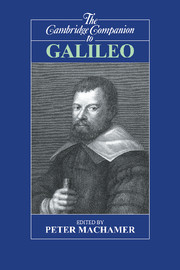Book contents
- Frontmatter
- Introduction
- 1 Galileo's Pisan studies in science and philosophy
- 2 Galileo's machines, his mathematics, and his experiments
- 3 The use and abuse of mathematical entities
- 4 Inertial problems in Galileo's preinertial framework
- 5 From Galileo to Augustine
- 6 Galileo's Copernicanism
- 7 Galileo's discoveries with the telescope and their evidence for the Copernican theory
- 8 Galileo on science and Scripture
- 9 Could there be another Galileo case?
- 10 The god of theologians and the god of astronomers
- 11 The never-ending Galileo story
- 12 The sepulchers of Galileo
- Bibliography
- Index
7 - Galileo's discoveries with the telescope and their evidence for the Copernican theory
Published online by Cambridge University Press: 28 May 2006
- Frontmatter
- Introduction
- 1 Galileo's Pisan studies in science and philosophy
- 2 Galileo's machines, his mathematics, and his experiments
- 3 The use and abuse of mathematical entities
- 4 Inertial problems in Galileo's preinertial framework
- 5 From Galileo to Augustine
- 6 Galileo's Copernicanism
- 7 Galileo's discoveries with the telescope and their evidence for the Copernican theory
- 8 Galileo on science and Scripture
- 9 Could there be another Galileo case?
- 10 The god of theologians and the god of astronomers
- 11 The never-ending Galileo story
- 12 The sepulchers of Galileo
- Bibliography
- Index
Summary
Galileo's researches in astronomy were more than original, they were unprecedented. He was not an astronomer in the sense of Copernicus, Tycho, and Kepler, making observations, devising models, and deriving parameters in order to compute tables and ephemerides for finding the positions of the Sun, Moon, and planets. Nor did he search for the physical principles governing the motions of the heavens as Kepler and later Newton did. Most of his work was concerned with two issues, the refutation of the Aristotelian and the defense of the Copernican “System of the World”, and his originality lies not so much in what he found as in how he interpreted his discoveries. Even his discoveries with the telescope, as interesting as they are in themselves - and it is hard to think of more surprising discoveries in the entire history of science - are of still greater interest for the conclusions that he drew from them, for nearly all of them could be turned to the criticism of Aristotle and the defense of Copernicus, and in his Dialogue on the Two Great Systems of the World that is just what Galileo did. Our concern here, however, is with his initial discoveries and his initial interpretations, which, although not as far-reaching as the conclusions he reached in the Dialogue, were upsetting enough to anyone who was not already a friend of Copernicus.
- Type
- Chapter
- Information
- The Cambridge Companion to Galileo , pp. 244 - 270Publisher: Cambridge University PressPrint publication year: 1998
- 8
- Cited by



